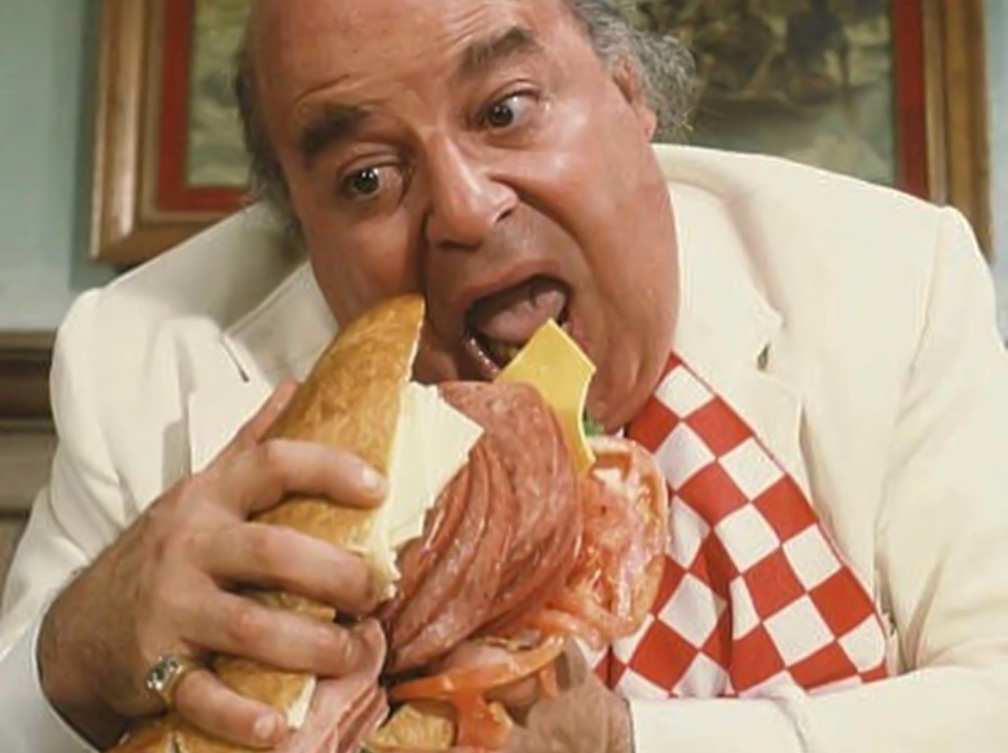The Naan-Disclosure Agreement

TWO CENTS | OCT 22, 2020
The Naan-Disclosure
Agreement
Some days I wonder if there are laws in place that technically make me a sandwich con-artist. Does merely slapping ham on rye mean I’m part of some underground sandwich syndicate?
I worked at a Back Bay sandwich shop the summer between sophomore and junior year of college. It would be the first summer I spent in Boston. I remember wandering down the luxurious Newbury Street in search of a job that could get me through the summer. I noticed a paper sign in the window: hiring line cooks and cashiers. I went in, met the owner, filled out an application and was invited back for a “formal interview.”
One thing led to the next, and I got the job. (That paper sign, by the way, stayed up the entire time I worked there. It was representative of the employee turnaround in this tiny yet intense establishment.)
It was what it was: a fast-casual place for grub. I signed the new hire paperwork on my first day, skimming it like an irrelevant Terms of Service page. I glanced at the piece of paper that said Non-Disclosure Agreement and signed it without hesitation. I was eager to press paninis and slow down the rest of the crew with my inexperience.
Though I learned the architectural intricacies of a sandwich in those three summer months, seven years have gone by and I know very little about the NDA I signed. Was there a non-compete in the paperwork? If I started working for a rival sandwich shop across the street would they hunt me down with a team of lawyers and get after me like I was some kind of Benedict Arnold? (This was New England after all.)
I can only assume the NDA said something along the lines of, “sandwich making of any kind outside of the premises is not allowed.” And maybe my signature is lazily scribbled below, assuming, sure – I need this minimum wage job more than my right to future sandwich opportunities.
Some days I wonder if there are laws in place that technically make me a sandwich con-artist. By that I mean, am I not allowed to make a sandwich at home? Does merely slapping ham on rye mean I’m part of some underground sandwich syndicate?
No, it seems a little ridiculous. I mean, who would deprive someone their right to a sandwich?
The way people sign paperwork these days (or “click-through-terms” as big businesses call them) I’m surprised more people don’t get stuck in the middle of sandwich con-artist situations.
According to Rodman Employment Law, an unreasonable and overreaching NDA can be a way for employers to flex their legalese. But at the same time, if the NDA gives too much control to the employer and is unfair to the employee, then the agreement may not hold up in court.
Think of a young, eager musician signing their first contract with a record label. As their fame erupts, the producer that’s ushered them to the top has their claws dug in to the artist’s finances. Then one day: surprise! All the musician’s work is owned by a third party corporation. One bad contract with a little confusing fine print and you’re screwed. It’s just too easy to sign some papers in the midst of desperation.
That got me thinking, is the paperwork I signed all those years ago at that little sandwich shop still even valid? As a joke, my girlfriend and I have toyed with the idea of moving back to Boston to open up a café right near the location of my former employer. I’ve been questioning my own ability to legally create sandwich recipes without accidentally stepping on their intellectual property. Can someone advise me if there is any risk here?
According to the sandwich connoisseur, Merriam-Webster, a sandwich is “two or more slices of bread or a split roll having a filling in between; or one slice of bread covered with food.” This incredibly vague definition gives me hope.
In fact, it’s hugely unclear what a sandwich is and what a sandwich is not. Is pizza a sandwich? Is buttered toast a sandwich? Is a loaf of bread a sandwich? What about a burrito? It seems the world is just one big sandwich! It’s one of those I’m not touching you arguments you can have as long as you’re willing to have a limber mind, bending all about, wasted on sandwiches.
It may be clear to you by now, but I’m not, in fact, a lawyer. Turns out a law degree requires a lot more than walking around the Harvard campus a few times in the fall, wearing a crimson crew neck sweater. (Although I should mention I’ve seen Legally Blonde more than three times.)
All that being said, I *think* I’m in the clear to open all the rival sandwich shops I want. I would assume that any sandwiches infringing on intellectual property is unlikely. (I guess a Big Mac might be an exception to that rule, but that would assume I agree that cheeseburgers are sandwiches, but I digress.)
After all, the cultural mélange of the essentials: bread, condiments, meat or veggie filling, occasional cheese … they’re a part of an uninfringed tradition. Even if I tried to make the exact same sandwich from my summer in the profession, there would still be slight departures from their menu due to my fuzzy memory of that year. And to them, I’m probably just some guy who worked at their sandwich shop for a couple months never to be heard from again. The chances they’re tracking my sandwich making this far down the line just seems unlikely.
On the off chance that they’re reading this right now, I’ll abide by the agreement and will continue making sandwiches at home.
SIMILAR ARTICLES




